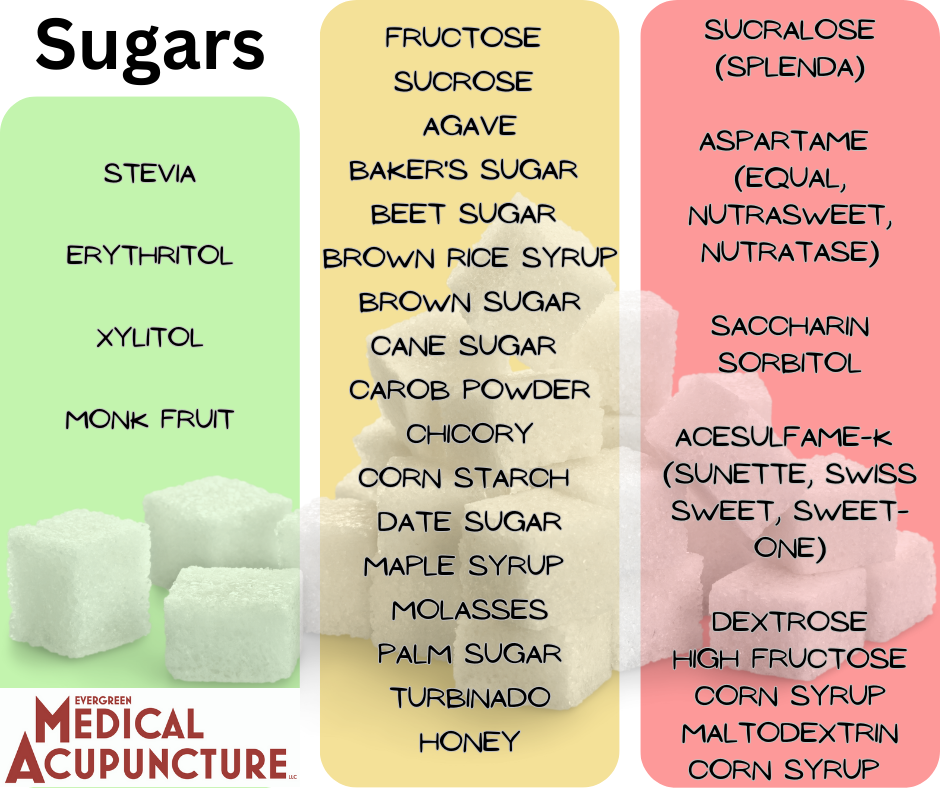Sugar is Enemy #1
Sugar causes detrimental health effects that often fly under the radar. Often, people have subclinical blood sugar issues even when their labs look "normal." Most people don't think of many other diseases besides diabetes that arise from overeating sugar, but I desperately challenge you to expand your knowledge of the destructive effects sugar has. At my acupuncture clinic, even when we see what might appear to be the most "simple" case (such as back pain, carpal tunnel, or sleep issues), we always ask patients about their diet. If someone has a poor diet, especially if they consume a lot of sugar, their inflammation is naturally going to be higher. This makes it difficult for the body to overcome even the most simple imbalances. When we get stuck on these simple cases, we will often help the patient do a detox from sugar (and sometimes from other inflammatory foods such as dairy and gluten). Amazingly, their sleep issues, hormones, or pain will rapidly resolve. Assessing a patient's blood sugar is the very first foundational principle we address. Using Functional Medicine (addressing health from the root problem), we might also assess someone's detox ability, microbiome (gut), essential fatty acids (cholesterol), and lifestyle (stress, overuse syndromes, sleep habits, and exercise routine). But blood sugar seems to be the majority of what we have to fix with most people. With blood sugar issues, what goes up, must come down.
Blood sugar crashes and spikes cause repeated insulin impact, which in turn can cause instability in other hormones and molecules such as cortisol (our stress hormone), adrenaline (our "fight or flight" hormone), and GABA (our anti-anxiety hormone). Glucose (sugar) can inhibit the release of GABA but temporarily increase the release of dopamine, which makes us feel connected and happy about that food or drink, but may make us more susceptible to anxiety after eating or drinking something sugar-laden. People report more trouble falling asleep when their glucose levels are too low. This can be from your body is having trouble breaking glycogen down to glucose. On the contrary, high blood sugar can cause high cortisol, which can induce an autoimmune response through low white blood cell activity. This, in turn, causes a spike in the inflammatory cytokines, Interleukin-6 (IL6) and T-helper 17 (Th17). Overexpression of IL-6 has been implicated in the pathology of several diseases including diabetes, rheumatoid arthritis, and cancer.1
"Recent data in humans and mice suggest that Th17 cells play an important role in the pathogenesis of a diverse group of immune-mediated diseases including psoriasis, rheumatoid arthritis, multiple sclerosis, inflammatory bowel disease, and asthma. 2"
Brain issues can even arise from sugar dysregulation.
A research article cites that a
"refined sugar diet reduces hippocampal brain-derived neurotrophic factor, neuronal plasticity, and learning.3 "
In other words, a diet too high in sugar can potentially cause sleep, memory, and hormone issues including low testosterone in men. It's quite profound how even small, subclinical blood sugar irregularities can cause palpable health changes.
Avoid at all costs:
Sucralose (Splenda)
Aspartame (Equal, NutraSweet, NutraTase)
Saccharin
Sorbitol
Acesulfame-K (Sunette, Swiss Sweet, Sweet-One)
Dextrose
High fructose corn syrup
Maltodextrin
Corn syrup
More naturally occurring sugars that should still be avoided or minimized because of their major impact on blood glucose include:
Fructose
Sucrose
Agave
Baker's sugar
Beet sugar
brown rice syrup
brown sugar
Cane sugar
Carob powder
Chicory
Corn starch
Date sugar
Maple syrup
Molasses
Palm sugar
Turbinado
Honey is also on this list, however, honey has some amazing health benefits so my rule of thumb is to consume no more than one teaspoon no more than three times per week. And make sure that it is local, raw, and unfiltered for the biggest benefit!
Best forms of Sugar:
Stevia
Erythritol
Xylitol
Monk Fruit
These are ok forms of sugar because they (technically) don't cause an effect on your blood sugar. I often suggest patients try to eat a low glycemic index diet (between 20-50). This "glycemic index" list can easily be found on the web and shows you which foods will cause the biggest impact on your blood sugar. Less than 50 is what you want to aim for in food. Anything above 50 should be consumed infrequently and in small amounts. There is another list called an "insulin index" that can also help you reduce your sugar impact. Keep in mind that carbohydrates such as bread and rice turn into sugar fast. Eating plenty of protein and healthy fats do the opposite of eating a diet high in sugar and carbs; they help balance your system out. Healthy fats include grass-fed pastured butter, ghee, coconut oil, extra virgin organic olive oil, avocado oil, nuts, seeds, organic cheeses, and fish oils. The fats that should be avoided include canola oil, vegetable oils, corn oil, soybean oil, peanut oil, sunflower oil, and margarine. Healthy proteins and fats stabilize your hormones, boost your metabolism, and balance many systems in your body.
One of the most powerful tools we use in my clinic, besides acupuncture, of course, is
Functional Medicine (or preventative medicine), is a customized lifestyle and diet modification plan. Acupuncture alone works wonderfully for blood sugar control, 4 but often, the effects of poor diet and lifestyle cannot be reversed without changing what you're doing daily. We see patients for just Functional Medicine consults or incorporate these modifications into your acupuncture sessions. We hope you have found some of this information helpful!
1 https://www.news-medical.net/health/Interleukin-6-and-
Disease.aspx#:~:text=Interleukin%2D6%20(IL%2D6,diabetes%2C%20rheumatoid%20arthritis%20and%20cancer.
2 Tesmer LA, Lundy SK, Sarkar S, Fox DA. Th17 cells in human disease. Immunol Rev. 2008 Jun;223:87-113. doi: 10.1111/j.1600-
065X.2008.00628.x. PMID: 18613831; PMCID: PMC3299089.
https://pubmed.ncbi.nlm.nih.gov/18613831/#:~:text=Recent%20data%20in%20humans%20and,inflammatory%20bowel%20disease
%2C%20and%20asthma.
3 Molteni R, Barnard RJ, Ying Z, Roberts CK, Gómez-Pinilla F. A high-fat, refined sugar diet reduces hippocampal brain-derived neurotrophic factor, neuronal plasticity, and learning. Neuroscience. 2002;112(4):803-14. doi: 10.1016/s0306-4522(02)00123-9. PMID:12088740
4 bit.ly/3iaNno8
When you subscribe to the blog, we will send you an e-mail when there are new updates on the site so you wouldn't miss them.

Comments